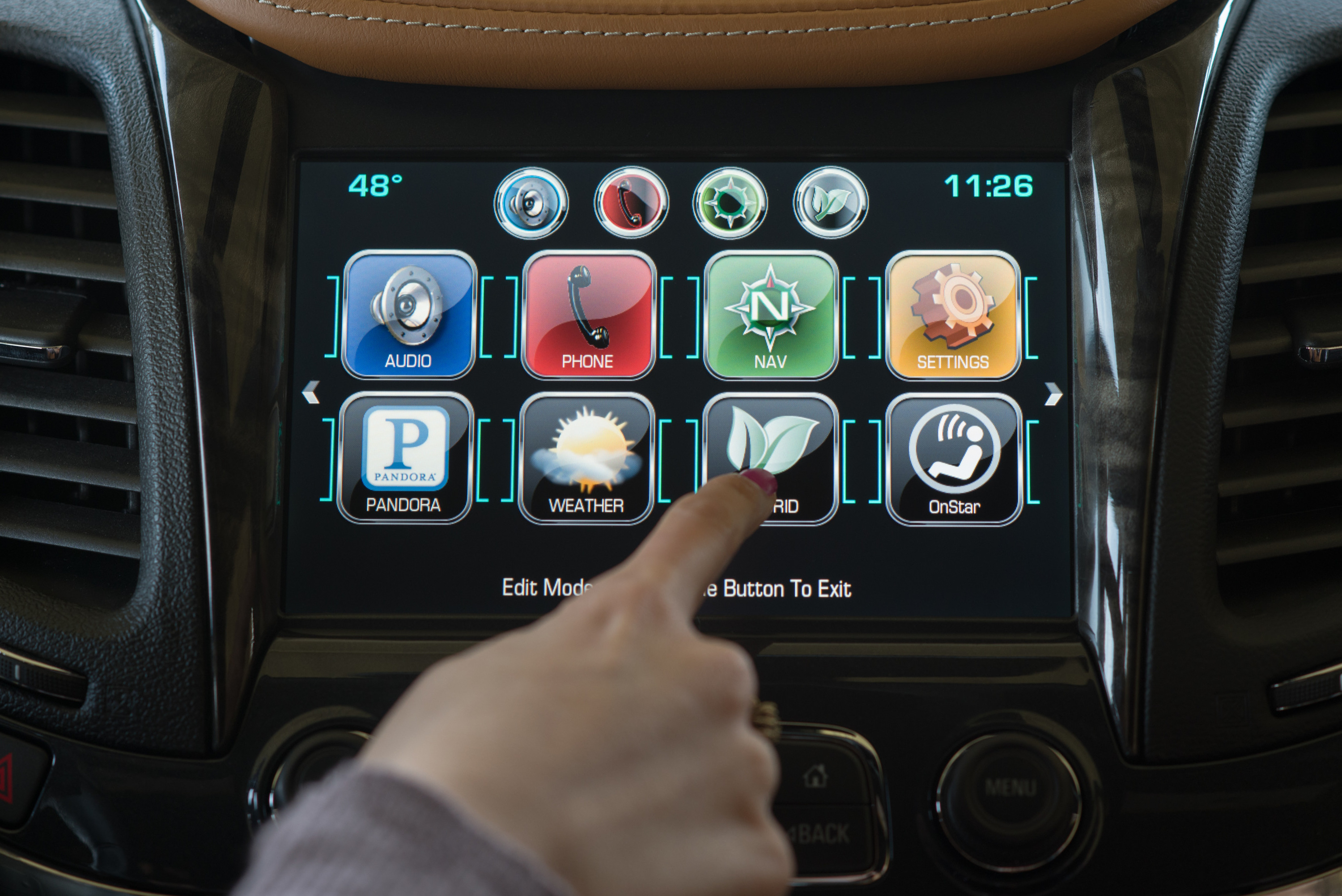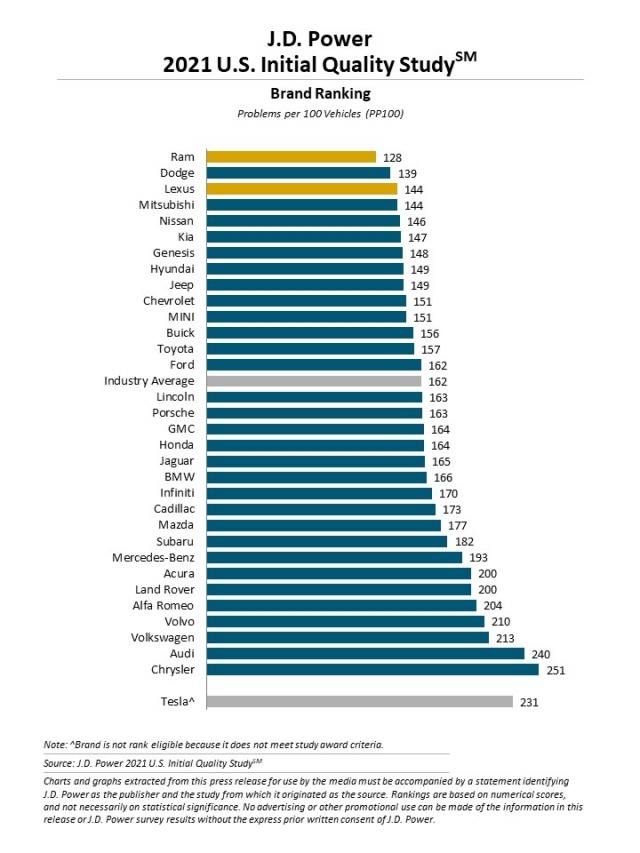Premium brands occupy most of the low spots in the customer-survey-based 2021 J.D. Power Initial Quality Study in which the Ram pickup truck ranks No.1 with the fewest reported problems.
It may seem ironic that many luxury brands lag behind mainstream nameplates, but there are a couple of logical explanations for that, says Dave Sargent, J.D. Power’s vice president-automotive quality.
First, upmarket vehicles contain more new and complex technology. “Customers tend to struggle with it,” he says. It’s less of an issue than something not working right.
Second, mass market automakers “continue to catch up in terms of fundamental build quality,” Sargent says during an online briefing on the latest study results.
Lexus ranking No.3 and Genesis (No.7) are the only two luxury brands performing above average.
Chrysler (down to mainly making minivans) is in the cellar, but close to it in highest numbers of reported problems are premium brands Audi, Volvo, Alfa Romeo and Land Rover.
Still, “the industry continues to improve,” Sargent says, citing a 3% improvement rate this year in fewer problems reported, “which is not bad” considering the environments of COVID, vehicle shortages and lots of newly introduced technology.
Twenty of 32 brands improved their quality from 2020. (A graphic showing all the rankings is below the story.)
Surveyed consumers’ complaints can range from powertrain issues to squeaks and rattles, but these days the most beefs by far center on infotainment systems.
“It’s the biggest challenge for the industry,” says Sargent (pictured below, left).
 Specifically, Android Auto and Apple Car Play draw the most consumer criticism. It’s not that they don’t work, but rather that many consumers reported struggling to connect with them properly. Sargent attributes that in part to more vehicles offering wireless connectivity.
Specifically, Android Auto and Apple Car Play draw the most consumer criticism. It’s not that they don’t work, but rather that many consumers reported struggling to connect with them properly. Sargent attributes that in part to more vehicles offering wireless connectivity.
“It’s not necessarily that (Android Auto and Apple Car Play) are not operating correctly.” But the connectivity issue is to a point where “some consumers gave up trying to use it,” he says. “That’s not good.”
One in four of all problems cited by new-vehicle owners are in the infotainment (pictured below) category, and six of the top 10 problems across the industry are infotainment-related. Smartphone connection is the top problem.
The Android Auto and Apple Car Play complaints have surpassed voice-recognition technology. For more than a decade, the latter was the No.1 problem in the annual survey.
“With more vehicles being fitted with the wireless technology owners want, the study reveals an increase in connectivity problems between smartphones and vehicles, leaving many owners unhappy,” Sargent says.
That’s led to finger-pointing between automakers and technology companies which blame each other for the consumer discontent. “It shows a need for the auto and tech industries to work together better,” he says.
He adds: “Owners want wireless connectivity, and the industry has responded. However, this has created a bigger technical challenge.”
Automakers generally face the wrath of owners on this issue, but it’s a shared problem, he says. “Owners don’t care who’s at fault. They just want their phone and their vehicle to talk to each other.”
Surveyed consumers’ overall complaints can range from something not working correctly to the way a feature is designed. The former is easier to resolve.
“Defects and problems can get fixed at the dealership,” Sargent says. “If there’s a design problem, there’s nothing the dealer can do. The consumer is stuck with it throughout the ownership of the vehicle.”
The 2021 U.S. Initial Quality Study, now in its 35th year, is based on responses from 110,827 purchasers and lessees of new 2021 model-year vehicles who were surveyed early in the ownership period.
The study is based on a 223-question battery organized into nine vehicle categories (infotainment; features, controls and displays; exterior; driving assistance; interior; powertrain; seats; driving experience; and climate).

The study was conducted from February through July 2021.
The parent corporation receiving the most model-level awards is Hyundai Motor Group (seven awards), followed by Toyota (five); BMW (four); Nissan (three) and then General Motors and Stellantis with two each.
Among brands, Kia receives the most segment awards (five), followed by BMW (four).
Hyundai Motor Group models that rank highest in their respective segments are Genesis G80, Hyundai Accent and Kia Forte, Sedona, Soul, Sportage and Telluride.
Toyota models that rank highest in their segments are Lexus RC, RX and UX and Toyota Sequoia and Tundra.
BMW models that rank highest in their segments are BMW 2-Series, X4, X6 and X7.
Toyota’s Motomachi 2 (Japan) plant, which produces the Lexus LC, receives the Platinum Plant Quality Award for producing vehicles with the fewest defects or malfunctions. Plant quality awards are based solely on defects and malfunctions and exclude design-related problems.
Nissan’s Smyrna 1 (Tennessee) plant, which produces the Nissan Murano, and BMW’s Dingolfing 2 (Germany) plant, which produces the BMW 7-Series and 8-Series, receive the Gold Plant Quality Award for the Americas and Europe/Africa regions, respectively.
(Steve Finlay is a retired WardsAuto senior editor. He can be reached at [email protected].






